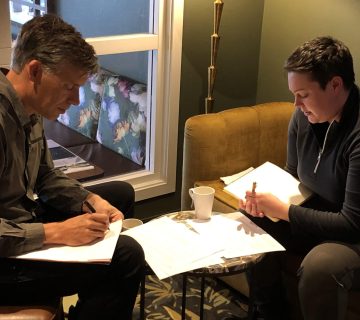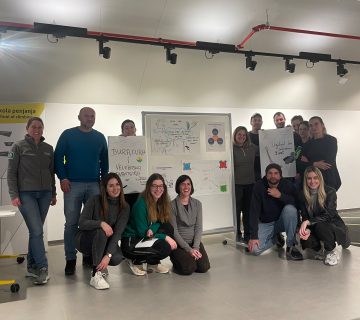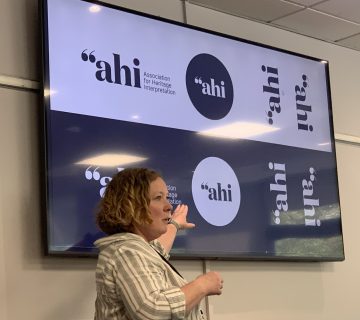Training in ‘Heritage interpretation in green tourism’ was held in the Berezinsky Reserve (Belarus) from 20-24 June 2016 for the first time in the Russian-speaking territory. The training was based on the HeriQ manual.
The training was arranged by the Belarussian Association, Country Escape, within the framework of the initiative ‘Ecotourism in Berezinsky Biosphere Reserve: innovative approaches, partnership models, ‘green’ consciousness’ of the EU/UNDP project ‘Supporting the transition to a green economy in the Republic of Belarus’. The training was based on the HeriQ manual and was conducted by Thorsten Ludwig, Managing Director of Interpret Europe.
Participants of the training were mostly young eco-tourism professionals from environmental agencies, national parks and reserves who wanted to become advanced green guides. During five days, participants practiced discovering the meaning and theme of ‘phenomena’, using props sparingly, evaluating an interpretive walk, changing formations, playing different roles and even making posters. In Thorsten’s opinion, the Belarusian group was active and open-minded to using new techniques, including the heritage interpretation creative methods.
Everybody was particularly impressed by the night interpretation performed during the evening programme. Bolotnik (a Belarusian bog spirit) surprised and amused guests by his sudden appearance and outstanding presentation. The aroma of tea with herbs, guitar songs in different languages, magic candles floating in glass stands in the forest in darkness created a very special atmosphere of unity between humans and nature. Each participant had to find a phenomenon nearby in the forest which touched his/her soul and to reveal its sacred, profound meaning. The candles and a thought-provoking note helped visitors to look at it with different eyes.
According to the feedback, participants have had great opportunity to use and develop new tourist products based on new knowledge and the tools they developed from the training.
‘Now it is impossible to continue with the tours by old methods because I have so many new ideas and themes for Berezinsky‘ (Elizaveta Sidorenko, tourism specialist of Berezinsky Reserve).
‘I turned from a scientist to a romantic person‘ (Ivan Tesul, specialist of the Braslav Lakes National Park).
‘We learned how to find meanings of the phenomena which hides a lot of secrets, mysteries, surprising and sometimes unexpected revelations‘ (Anastassia Reshetnikova, teacher of University).
‘Each flower, stone or tree were filled with new meanings and started to be brightened by new colors. Only this way of transferring information could allow visitors to reach harmony with nature. This is the connecting link which will be the integral part of my life from now and forever‘ (Eygeni Shevchik, specialist of Aziory Reserve).
Participants have decided to form a network of nature interpreters and develop this concept in Belarus.
Dr. Valeria Klitsounova is Chair of the Board of the NGO ‘Country Escape’ and Associate Professor of the Belarusian State University. She is the author of the very first book on interpretation in Russian ‘Heritage interpretation in tourism: new approaches in experiencing the economy era’. She is an NAI and IE member. You can get in touch with her at lera.greenbelarus@gmail.com.
To cite this article:
Klitsounova, V. (2016) ‘First interpretive guide training in former Soviet Union countrie’. In Interpret Europe Newsletter 2-2016, 12
Available online:
https://www.interpret-europe.net/fileadmin/Documents/publications/Newsletters/ie-newsletter_2016-2_summer.pdf




